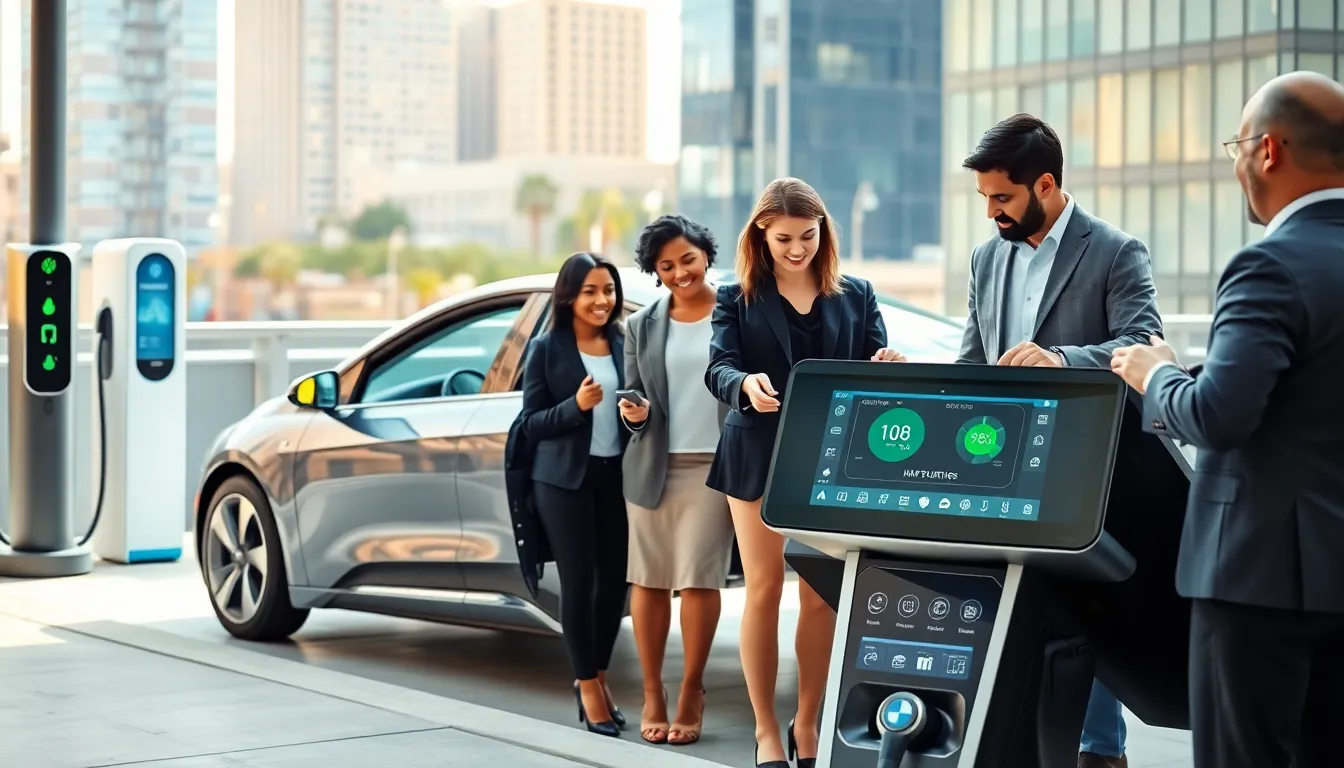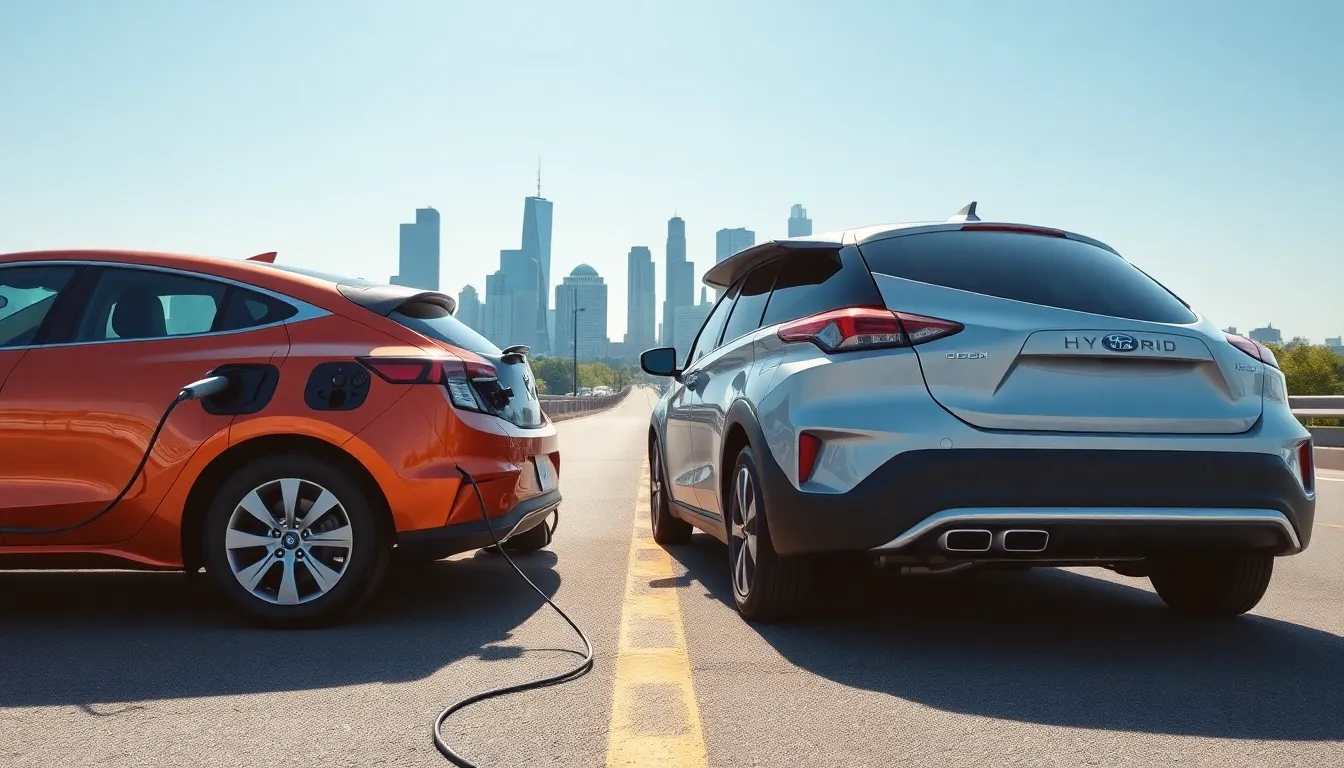Table of Contents
ToggleWhen it comes to navigating the ever-changing world of cars, the choice between electric and hybrid vehicles can feel like picking between coffee and tea, both have their loyal fans, but only one can get you buzzing with excitement. In this text, we’ll unpack everything you need to know about electric and hybrid vehicles, digging into their features, benefits, and what sets them apart. Whether you’re a tech enthusiast or someone who just wants to save on gas, there’s something here for everyone. Buckle up as we drive through the nuances of these modern marvels.
Understanding Electric Vehicles

Key Features of Electric Vehicles
Electric vehicles (EVs) run exclusively on electricity, eliminating the need for traditional gasoline engines. Powered by rechargeable batteries, they come equipped with electric motors that deliver instantaneous torque and smooth acceleration. Many models also feature regenerative braking systems that capture energy during braking and feed it back into the battery. Besides, the design of EVs often includes advanced technology like touchscreen dashboards, autonomous driving capabilities, and over-the-air updates.
Benefits of Electric Vehicles
One of the most attractive aspects of electric vehicles is their environmental impact. With zero tailpipe emissions, EVs contribute significantly less air pollution than their fossil-fuel counterparts. Also, they offer cost savings in terms of fuel and maintenance. Electricity is generally cheaper than gasoline, and EV owners enjoy fewer mechanical issues thanks to simpler engines. Also, governments often provide incentives such as tax credits and rebates, making the initial purchase more affordable.
Understanding Hybrid Vehicles
Key Features of Hybrid Vehicles
Hybrid vehicles combine an internal combustion engine with an electric motor, allowing for improved fuel efficiency. They operate on a system that seamlessly switches between the electric motor and gas engine, depending on driving conditions. Many hybrids also include regenerative braking technology, harnessing energy that would otherwise be wasted. This dual approach results in longer ranges compared to purely electric vehicles.
Benefits of Hybrid Vehicles
One of the primary advantages of hybrid vehicles is their versatility. They perform well in city traffic, where electric motors can handle stop-and-go driving, and the gasoline engine kicks in at higher speeds or for longer trips. Also, hybrids produce lower emissions than conventional vehicles and don’t require extensive charging infrastructures, making them an appealing choice for those who may not have access to charging stations.
Comparative Analysis: Electric Vs Hybrid
Cost Efficiency and Savings
Electric vehicles might have a higher upfront cost, but they make up for that in savings on fuel and maintenance. Generally, the cost per mile is lower when it comes to electric energy compared to gasoline. But, hybrids can be more cost-effective for those who drive long distances frequently. The choice between the two often boils down to individual driving habits and preferences.
Environmental Impact
When comparing environmental benefits, electric vehicles generally take the lead due to zero emissions. Yet, the effectiveness of this factor heavily depends on the source of the electricity used. For example, if the electricity comes from fossil fuels, the difference may not be as vast. Hybrids still create emissions but significantly lower than traditional vehicles. Both options represent a step toward reducing dependence on fossil fuels.
Driving Experience and Practicality
Electric vehicles are known for their quiet operation and quick acceleration, which can create a delightful driving experience. On the other hand, hybrid vehicles offer the benefit of range anxiety reduction since they can rely on gasoline when needed. Each option has its distinct driving feel, and the choice will depend on how an individual prioritizes these aspects.
Future Trends in Electric and Hybrid Technologies
Innovations on the Horizon
The future of electric and hybrid vehicles looks bright, with advancements in battery technology promising longer ranges and faster charging times. Researchers are working on solid-state batteries, which could revolutionize the industry by enhancing safety and performance. Besides, automakers are increasingly investing in autonomous driving features, integrating sophisticated technology that can redefine transportation.
Government Policies and Incentives
Governments globally are energizing the shift toward sustainable transport through legislation and financial incentives. Many countries are setting timelines to phase out gasoline vehicles, while enhancing the charging infrastructure to support electric vehicles. Tax credits, subsidies, and rebates are becoming common to encourage consumers to make the greener choice, further boosting the market for both electric and hybrid vehicles.







